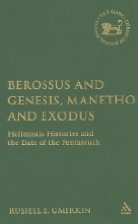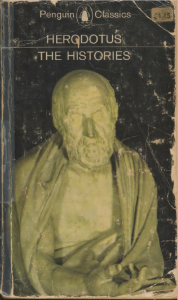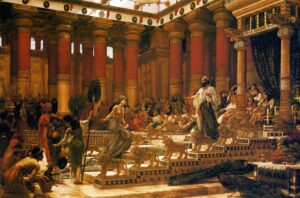Imagine digging down through centuries of layers at an archaeological site and suddenly finding an old smartphone. You would know it must have been planted there by some trickster. You would know that it could not be more than a few years old despite uncovering it in a layer supposedly centuries old.
I believe it can be shown that a similar problem faces us when we try to place the earliest writings of the Bible back into the times of King David and Solomon. Further, if we try to check how old the Biblical works are and use in principle the same type of reasoning as we intuitively use for dating the approximate era of the smartphone, we default to the Hellenistic period. That is an extreme comparison but in principle it is a valid one. I will try to demonstrate its validity by quoting (in translation) the words of the scholar who was the first to assign the earliest works of the Bible to the time of King Solomon.

I am referring to Gerhard von Rad. (I introduced von Rad in a post outlining the rise of the Documentary Hypothesis.) The chapter of his that I am using is Collected studies on the Old Testament (= Gesammelte Studien zum Alten Testament), specifically his 1944 chapter, The Beginning of Historiography in Ancient Israel (= Der Anfang der Geschichtsschreibung im alten Israel pp 148-188)
Von Rad begins:
For the modern peoples of the West, historiography is one of the most natural intellectual activities. It seems to us to be absolutely essential for a more intensive understanding of existence. In this respect, the peoples of the Western culture are students and heirs of both Greek and biblical historiography.
Does that opening not set off alarm bells? I am writing in the context of earlier posts addressing works of Niels Peter Lemche, Philippe Wajdenbaum, Russell Gmirkin and others who argue for dating the origins of the Hebrew Bible in the Hellenistic era. Von Rad begins by pointing out that the only comparable historical writing to the Bible is found among the Greeks.
It is easy to see that most ancient peoples did not achieve this form of a more intensive understanding of existence. . . . [T]hey didn’t produce any historiography.
Not the Egyptians?
The ancient Egyptians were characterized by a striking inability to think historically in the sense described above. Eminently conservative, eminently fond of writing, they always focused their reflections on the past in an antiquarian way on details and were unable to grasp larger contexts.
Nor the Mesopotamians?
But the cultures of Mesopotamia, no matter how eventful the history in this area was, did not create a representation of history that went significantly beyond individual documents of the type mentioned above. At best, one can speak of an attempt to grasp the course of historical events in a uniform manner using list science. But their strength failed when faced with the task of presenting and interpreting national history in a unified manner.
But what of the Hellenistic era Greeks?
It was only Berossus who attempted to write their history, long after the great empires had left the stage of history. But this only happened under Greek influence. . . . There are only two peoples who really made history in ancient times: the Greeks and, long before them, the Israelites.
 Some of us will be reminded of a work that argued for the Hebrew Bible using the Hellenistic era work of Berossus as one of its sources:
Some of us will be reminded of a work that argued for the Hebrew Bible using the Hellenistic era work of Berossus as one of its sources:
- Gmirkin, Russell. Berossus and Genesis, Manetho and Exodus: Hellenistic Histories and the Date of the Pentateuch. New York: Bloomsbury T&T Clark, 2006.
Interestingly, Gerhard von Rad noted that we do not have earlier primitive precursors to the historical writing we read in the Old Testament. The OT comes to us without known Hebrew forebears. It appears in a mature form, as if (my addition here) its forebears lay outside Palestine.
The “emergence” of ancient Israelite historiography cannot be described. It is there at a certain point in time, and it stands there before us in its most perfect form.
How to explain this sudden emergence of the historical writings — Genesis through to 1-2 Kings — of the Hebrew Bible? Von Rad posits three causes:
1. Israelites applied origin stories (etiologies) not only to local phenomena (e.g. various ethnic groups, an altar of stones, a deserted village) but to more universalistic themes: the place of women, why suffering, and so forth. This attention to “the basic facts of human existence” is thought to have given Israelites an edge in seeing the bigger picture of past events.
2. Israelites had an “overarching give of narrative exposition”. They could write simply yet powerfully.
3. Israelites, uniquely, had a monotheistic belief in a certain kind of God, a God who controlled all major human events. It wasn’t left up to demons or lesser sprites to direct human affairs but Yahweh himself.
You will probably be thinking that the above three explanations are really just other ways of describing what is begging for an explanation: why is it that historical writing as we see it in the Bible originated with Israelites, supposedly before the rise of Greek historical writing? The “explanations” also seem to suggest that the “Israelites” had qualities that set them apart from the rest of common humanity in their time.

For von Rad, it was particularly the religious beliefs of the Israelites that was the key factor. Their god was imagined to have a position over humanity that no other god in the minds of other peoples had — with the exception of the later Greeks.
The Israelites came to thinking about history and then to writing history from their belief in the power of God to make history. For them, “history is an event of God. God sets the movement in motion with his promise. He sets the target according to his will and he watches over her… All history comes from God and occurs for God” [quoting Regenbogen, Thukydides als politischer Denker]. We can already see here: it is a very unique historical thinking that we are now approaching, because the focus of events is not at all on the earthly stage; neither nations, nor kings, nor glorious heroes are the actual actors; and therefore, in the ultimate sense, they are not the subject of the representation. And yet all the immanent events are followed with breathless interest and the highest inner involvement, precisely because it is the field of activity of divine action. Herodotus also knows “metaphysical powers that have a moving effect on the world of earthly events through a diverse apparatus of signs, prophecies and dreams” [quoting Regenbogen]. . . .
For Herodotus it was the god Apollo who was overseeing and guiding the course of events in the struggle between the Greeks and Persians. Apollo’s oracle at Delphi functioned in a similar way to Yahweh’s Jerusalem. I once posted a brief outline of what other scholars have observed are overlaps between Herodotus’s Histories and the Bible’s “Primary History”: Correlations between the “Histories” of Herodotus and the Bible’s History of Israel.
Von Rad is always quick to try to point out where the Greek histories are unlike those in the Bible. I could discuss what he posits as significant differences but I want to focus here on the similarities and may do so in the near future. For example, he observes that the role of the divinity in guiding history is not as explicitly pervasive in Herodotus as it is in the Bible. I think such a difference is one of degree, not of kind.
Von Rad zeroes in on the biblical account of the rise of David to kingship and the rule of King Solomon as if that narrative is a historical record. He cannot conceive of it as fiction. It was written by a man full of godly character who is obviously documenting true events, so von Rad suggests:
We do not know the historian who described these events to us. He must have been a man who had precise knowledge of the circumstances and events at court. His descriptions breathe a closeness to life that makes any doubts about the reliability of his portrayal disappear. This author is characterized by a penetrating knowledge of human nature; His attitude towards David himself is particularly impressive. The figure of the king is everywhere drawn with warm sympathy and great reverence. However, the author has retained his freedom of judgment in the most unbiased manner. He never covered up the king’s guilt and failure. But even when he reports dark and ugly things with his “heroic truthfulness” that is unique in the Orient, he does not give in to the lasciviousness of gossip, but always remains chaste and noble. This leads us to the most important question, namely that of the theological and ideological content of his historiography.
The biblical description of the kingdom of David and Solomon is assumed to be historically valid: recall von Rad informing us of the ability of the biblical historian to write simply yet powerfully!
Von Rad explains that this history of David is told as a “secular” narrative with only three passages alerting us to God’s role behind the scenes. (He seems to be coming close to contradicting his earlier point that it was the theological emphasis that distinguished the Biblical historiography from that of the “more secular” Herodotus.)
[W]e have highlighted [in the account of David] the peculiarly secular way of presenting this historiography, for example in comparison to the naive belief in miracles in the heroic legend. This view of history and God’s actions in history must have been nothing short of revolutionary at the time.

And so we return to discovering the archaeologist unearthing a smartphone in a layer centuries old.
But to make this view of when the biblical history was written sound more plausible von Rad smooths out some of the edges of the idea of it being totally “revolutionary at the time”:
No matter how much one praises the originality and theological genius of our author, such a show also had to have its intellectual-historical prerequisites for the time, because in every historiography an “overall cultural consciousness” is presupposed.
Creativity does not arise without debt to preconditions of some kind.
So how to explain the appearance of this smartphone? For von Rad, it is not difficult:
It is really not difficult to understand this historiography in the context of the Solomonic era, within which it undoubtedly emerged. It was only in [this] epoch . . . that the new things that had already begun under David had a cultural impact on all sides. . . . Life began on a much broader cultural basis than was possible a generation ago. We hear from Solomon that he established large-scale trade relations with distant lands. Riches came into the land; luxury and well-being moved into the court and major building activity began. This flourishing economic life was naturally followed by an intensive intellectual exchange. At no time in the entire history of this people were the regulations against the importation of spiritual religious goods so liberally applied as in this era. The court was a foster home of international wisdom, like the Egyptian courts of old. The presence of so many foreigners gave rise to obligations which were readily fulfilled; places of worship were built for non-Israelite deities. In a word, the era of Solomon was an era of enlightenment, of the abrupt demolition of the old patriarchal order of life.
That’s interesting in a way, but it prompts me to ask what foreign influences, what other peoples of the day, contributed to this secular and broad new historiography? Herodotus had not been born yet. What were the specific types of ideas that other peoples of Solomon’s day contributed to Solomon’s court that led to such “intellectual enlightenment”?
The archaic institution of holy war, the simple form of worship at shrines with its cult legends were undermined by a flood of secular thinking. The cult legends broke away from their traditional attachment points and became literature. Don’t we also feel this cool touch of a modern, free and entirely non-cultic spirituality in our historical work at every turn?
What was it, one has to ask, about other cultures that enabled the birth of a “modern, free spirituality” in the days of Solomon? I doubt anyone can point to any work of literature, to any religious concept, among Israel’s neighbours that fostered such a modern concept.
I suggest that the simpler and more obvious answer should be found in the influence of Greek culture (both literature and ideas) that swept over the Levant and beyond after the conquests of Alexander the Great.
There is an English language version of Gerhard von Rad’s essay in From Genesis to Chronicles : explorations in Old Testament theology. See pages 125ff
If you enjoyed this post, please consider donating to Vridar. Thanks!

Just another example of how even otherwise Great historians CANNOT see clearly when they already think they “know” the answers and, of course, their unquestioned assumptions MUST be true. After all, they are “professional historians”.
They’re smart cookies. It happens to all of us. There was a time when we knew the earth could not possibly be rotating or our hats would blow off. It’s when malice and other vices shut our minds that we have cause to worry.
Nice stuff.
TYPO: “Overarching give”.
give = gift, thx
Storytime! There is a point to this…
In the early 1990s I went on an archaeological dig at Ashqelon. Mostly famous for the Philistines, it was a Canaanite city before that; we dug in the hillock without Philistine remains but a Canaanite gate, so we were hoping to find some Bronze Age buildings there.
Anyway after locating the trash-midden from the Islamic period, I (me) found what looked like a piece of glazed broken plate from the nearby resort hotel. I blurted out to the head of this dig: “okay… who’s the joker”.
There was no joker. It was genuine Chinese porcelain, imported into the Islamic world. Broken, so that’s why it had been dumped in the midden I was digging at. I was just ignorant.
Moral: a thing can look fake for the time and place, but can be a real thing.
Back to the “first historians” as Baruch Halpern put it: might we be looking at a Syro-Anatolian tradition mostly lost to us? Coastal Canaanites, as traders, were exposed to numerous religions. They would not have accepted all of them. On returning home, they might have pondered the local temples preaching their own mumbo-jumbo and, incidentally, raking in great wealth (they often served as banks, as well). The trader also had wealth (if he was any good) but figured he’d earned it, unlike the temple. More to the point the trader could probably write, as well.
We’re just materially missing Canaan’s documents. It wasn’t pushed into tablets like the Assyrians were doing, and the weather wasn’t as dry as Egypt. But there’s an historical Hittite tradition, aware of (say) failed sieges like that of Urshu.
Your Chinese porcelain in Ashqelon had a common explanation — trade. Indeed, it is trading relationships and extents that are determined by noting “out of place” artefacts as far back as pre-historic times. Your find was recognized as “from that world and era” but from a different place.
That is quite different from an intellectual and literary accomplishment that has no parallels at all in the time period in question. Not even in Greece. As noted in the post, Herodotus was not even born in the time of Solomon.
Now there are some historians who accept the early date for the Bible but they are consistent in their explanations: some say that it was the Hebrews who influenced the Greeks. Now that would make theoretical sense of a post-Solomon generation of Greeks, namely Herodotus, being influenced by the Primary History. In my view, however, that hypothesis runs into other difficulties that are non falsifiable.
It is always possible to say “We’re just materially missing Canaan’s documents” but that fails on three grounds:
1) it is an explanation for why we do not have the evidence that would support our hypothesis for an early date for the Bible, and an explanation for why we do not have the evidence we need is not a substitute for the simple fact that we still do not have that evidence. The right response, I believe, is to take the position that all knowledge is tentative and we are always open to changing our understanding as new evidence emerges. I am more than willing to post a retraction to the above post by saying that Hey, some exciting, unprecedented new evidence has turned up. What we thought to the best of our understanding based on our information at the time has been superseded by new information. It will be a most exciting time of new discovery. — (Perhaps von Rad’s insistence on Solomon drawing people from afar to his court should explain the unique features of biblical historiography, but I don’t believe there were any cultures however far from Solomon’s court who produced anything like that kind of literature that the Hebrews developed at that time.)
2) Cultural artefacts require explanation. The kind of intellectual and literary work that is the Primary History requires a social infrastructure of a complex kind that the archaeological evidence tells us was simply not in existence near Jerusalem circa 1000 BCE; nor is there any evidence of awareness/influence of precursors to the kind of intellectual and literary content of the Primary History in any other local or distant place at that time – on the contrary, all intellectual and literary and cultural artefacts anywhere before the fifth century Greeks allowed no room for the kind of work that is the Primary History.
3) We do have Canaanite documents, and they actually point to the Hebrew Bible being the anomaly, the cuckoo in the nest. It is the Canaanite documents that we do have that support the point expressed in the post.
I truly dislike references to the so-called Oriental or Eastern mind or thought-patterns – which I confess is in part because I am exasperated when non-Buddhists, who may be Christians, lump all of Buddhism into the category of Eastern thought/philosophy/religions, which is set aside from and implicitly or explicitly inferior to Western thought/philosophy/religions. Leaving aside for now the implicit racism behind such thoughts and actions, such categorization is very Eurocentric. 1 of my favourite books from the perspective of Buddhism, history, and geography, is Xuanzang’s Great Tang Record of the Western Regions, which turns this eurocentrism upon its head. Xuanzang, a Buddhist so devout that he was able to go illegally to India anbd study Buddhism at Nalanda University, was still compelled by cultural forces to lump Buddhism as a Western religion!
If I were wanting to further this rant, I would talk about how Shinran and Martin Luther, despite alegedly not being both practitioners of Eastern religions, had more in common with each other then, for example, the Catholics and the Westborogh Baptist Church have in common with each other despite both being Christian.
But I want to focus upon this post some more.
Von Rad’s claim that “We do not know the historian who described these events to us. He must have been a man who had precise knowledge of the circumstances and events at court. His descriptions breathe a closeness to life that makes any doubts about the reliability of his portrayal disappear.” is childish in its naivity now that we have so many excellent examples of historical fiction and speculative fiction in which imaginary events are set in (pseudo-)historical pasts using writing styles which imitate this type of allegedly factual writing. Using Von Rad’s reasoning, a naive historian writing in a future might say, about anonymized and relocated versions of, for example, George R. R. Martin’s Song of Ice and Fire, “We do not know the historian who described these events to us. He must have been a man who had precise knowledge of the circumstances and events at court. His descriptions breathe a closeness to life that makes any doubts about the reliability of his portrayal disappear.” After all, Martin’s Song of Ice and Fire series has details and blends realism with allegations about divine intervention and miracles – the witch of Endor and the Ghost of High Heart could easily appear in each others’ settings because they perform similar roles. But we know that Martin was not a historian but a writer of fiction – which is details which we do not know about the author(s) of the primary history from the Hebrew scriptures.
Some may allege that I am cheating to compare the primary history from the Hebrew scriptures to a hypothetical anonymized and relocated version of George R. R. Martin’s Song of Ice and Fire, but peomple have noted that the Hebrew Scriptures contain similarities to earlier stories set elsewhere, meaning that I think that it is at least possible that the primary history from the Hebrew scriptures is an anonymized and relocated version of earlier stories – even though I am not sure whether I would support Gmirkin’s model for the origins of the primary history from the Hebrew scriptures.
Yes, von Rad wrote before Edward Said and his book Orientalism. I wrote about it here: https://vridar.org/2013/04/22/orientalism-us-and-islam/
I included his “unique in the Orient” reference to draw attention to the “earlier” (I wish it were totally earlier and no longer with us at all) European mindset that he was coming from — as another pointer to observant readers like you to pause and question before accepting his analysis.
Indeed, but the reasoning is still oh so very common among biblical scholars!